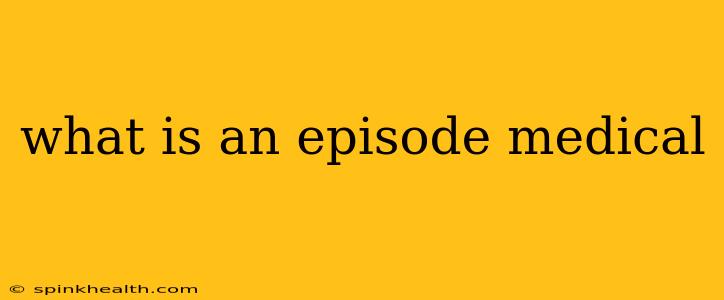What is an Episode of Care in Medicine? A Journey Through Healthcare's Building Blocks
Imagine a patient's healthcare journey as a story. It's not a single sentence, but a collection of chapters, each with its own beginning, middle, and end. In medical terms, each of these chapters is an episode of care. Understanding this concept is crucial for both patients and healthcare professionals, as it helps streamline care, manage resources, and improve overall health outcomes.
This isn't just about a single doctor's visit; it encompasses a much broader scope. Let's delve deeper into what constitutes an episode of care and explore some frequently asked questions surrounding this important topic.
What defines the start and end of an episode of care?
This is where it gets interesting. The boundaries of an episode aren't always crystal clear. It often depends on the specific condition being treated and the healthcare system's definition. Generally, an episode begins when a patient seeks treatment for a specific health problem and ends when that problem is resolved or the patient's condition stabilizes, even if they need ongoing management.
For example, an episode might start with a visit to the emergency room for a severe asthma attack. It might include subsequent hospital stays, doctor visits, physical therapy, and medication management. The episode ends when the asthma is under control and the patient is back to their baseline health.
However, if the patient experiences another severe asthma attack later, that would be considered a new episode of care.
How is an episode of care different from a single visit?
A single visit is a single interaction with a healthcare provider. It's a slice of the overall healthcare journey. An episode of care, on the other hand, encompasses all the care related to a specific health problem over a period of time, encompassing many different interactions with various healthcare professionals. It's the whole story, not just a single scene.
What types of healthcare services are included in an episode of care?
An episode of care can encompass a wide range of services, including:
- Hospital stays: Inpatient care, including surgery and intensive care.
- Outpatient visits: Doctor's appointments, specialist consultations, physical therapy sessions.
- Diagnostic tests: X-rays, blood tests, MRIs.
- Medication: Prescriptions and dispensing.
- Rehabilitation services: Physical, occupational, and speech therapy.
How is the cost of an episode of care calculated?
The cost of an episode of care is the total cost of all the services provided during that episode. This can be complex and depends on several factors, including the type and intensity of services, the location of care, and the individual healthcare provider's billing practices. Understanding these costs is crucial for patients and insurance providers alike.
How does an episode of care affect healthcare billing and reimbursement?
Healthcare providers are often reimbursed based on the services provided during an episode of care. Different payment models exist, such as bundled payments, where a single payment covers all services related to a specific episode, regardless of the number of services provided. This encourages efficient and coordinated care.
What are the benefits of using the episode of care concept?
The episode of care model offers several benefits:
- Improved coordination of care: It provides a framework for healthcare providers to work together more effectively.
- Better management of resources: By understanding the costs and resources associated with an episode, healthcare systems can optimize their allocation of resources.
- Enhanced patient outcomes: More coordinated and efficient care can lead to better patient outcomes.
- More transparent billing: Bundled payments can increase transparency and predictability of healthcare costs for patients.
In conclusion, the episode of care is a fundamental concept in modern healthcare. By understanding its components and implications, patients can better navigate their healthcare journey, and healthcare providers can deliver more efficient and effective care. It's about looking at the whole picture, not just individual snapshots, to provide the best possible patient experience and health outcomes.

